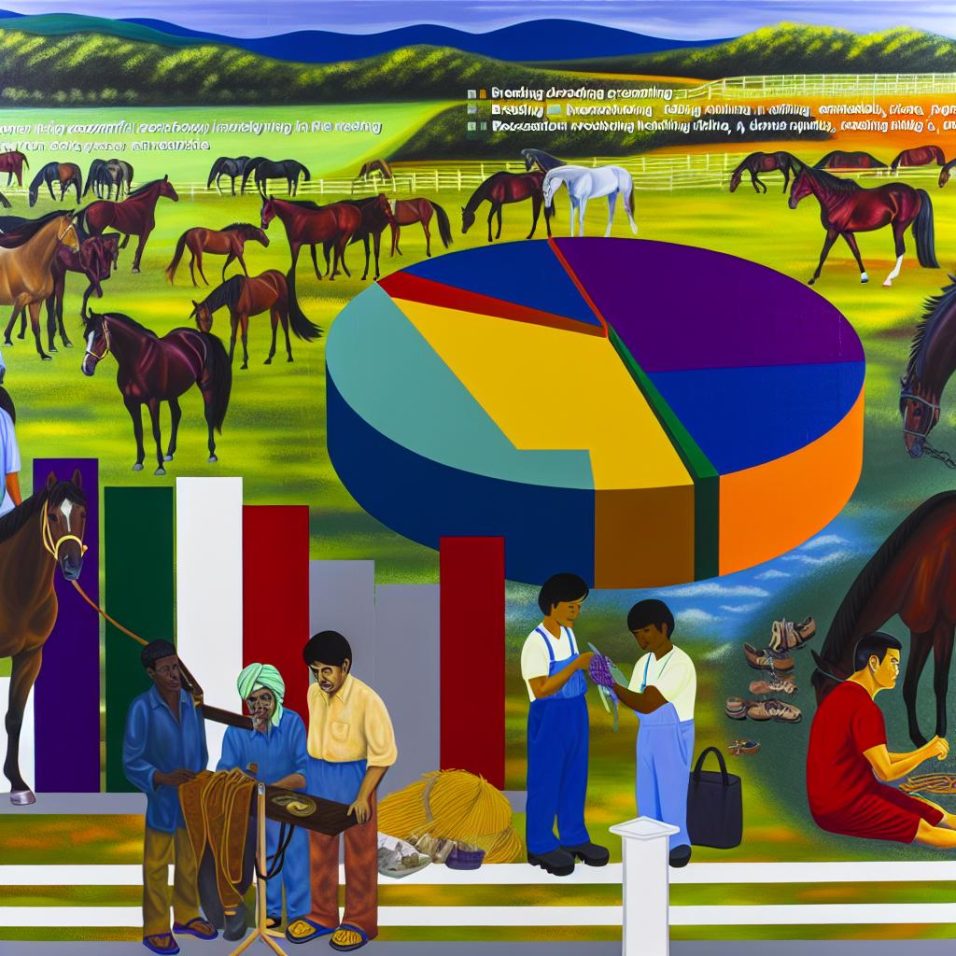The Virginia Horse Industry: An Overview
The Commonwealth of Virginia boasts a rich and storied history in the horse industry, making it an integral part of the state’s economic landscape. The horse industry in Virginia is not only a key economic driver but also a vital contributor to the state’s cultural heritage and agricultural practices. This comprehensive overview sheds light on the multifaceted roles that horses play in Virginia, from sporting events to breeding and beyond.
Economic Contribution
Virginia’s horse industry is a cornerstone of the state’s economy, contributing billions of dollars annually. This substantial economic input stems from several core areas. Firstly, the sale of horses and related equestrian products contributes directly to the financial figures. These products range from saddles and riding gear to specialized feed and grooming essentials.
In addition to these sales, the industry fosters a network of indirect contributions through a variety of associated sectors. Tourism is a major beneficiary, with horse-related events attracting visitors from outside the state. This influx supports local businesses, including hotels, restaurants, and retail establishments. Moreover, sectors such as feed production and equipment manufacturing are bolstered by the demands of the horse industry, further enhancing the economic impact.
Bolstering local economies, especially in rural areas, the horse industry provides a vital economic lifeline that stimulates growth and development. Urban areas also benefit through industry-related events that drive economic activity and enhance the state’s reputation as a hub for equestrian pursuits.
Employment Opportunities
One of the most significant benefits of the Virginia horse industry is the employment opportunities it generates. Thousands of Virginians find employment within the industry, from directly working with horses to related roles in management and training. These positions require a diverse range of skills and expertise, reflecting the dynamic nature of the industry.
Beyond direct employment, the horse industry supports a variety of ancillary jobs. Veterinary care is essential for maintaining the health and welfare of the horse population, creating demand for skilled veterinarians and support staff. Transportation services are crucial for moving horses to events and sales, necessitating experienced drivers and logistics experts. Retail operations specializing in horse-related goods further add to the employment landscape, providing jobs in customer service, inventory management, and more.
The industry’s ripple effect on employment extends to sectors like real estate, where land is often purchased for stables and training facilities, further driving job creation. In this way, the horse industry serves as a substantive contributor to statewide employment figures, positively impacting individuals and families across Virginia.
Horse Population and Activities
Virginia is recognized for its diverse and thriving horse population, encompassing tens of thousands of horses across a range of breeds. These horses are central to numerous activities that highlight Virginia’s equestrian expertise and passion.
Racing is a prominent aspect of the horse industry, with several tracks hosting events that draw in large crowds and generate substantial revenue. Show competitions also feature heavily in the state’s equestrian calendar, including both national and local events that showcase various disciplines and skills.
Trail riding is another popular activity, offering Virginians and tourists alike the opportunity to explore the state’s stunning landscapes from horseback. Therapeutic riding programs highlight the industry’s versatility, using equine companionship to assist individuals with disabilities in achieving greater physical and emotional well-being.
The state hosts a plethora of equestrian events annually, such as Virginia Horse Festival and Upperville Colt & Horse Show, which attract participants and spectators nationwide. These events not only bolster the economy but also enhance Virginia’s standing as a premier destination for horse enthusiasts.
Challenges and Opportunities
While the Virginia horse industry is a vital economic and cultural asset, it does face significant challenges. Land development pressures pose a threat to the open spaces needed for horse breeding and training, sometimes leading to a reduction in available land for equestrian activities. Additionally, shifts in consumer preferences and leisure activities can influence the demand for traditional horse-related pursuits.
Regulatory environments are also evolving, with changes that could impact everything from animal welfare regulations to land use policies. This presents both a challenge and an opportunity as industry stakeholders must adapt to these dynamics to ensure sustainable growth and development.
Opportunities for innovation arise amidst these challenges. For instance, adopting sustainable farming practices can help alleviate land usage concerns and contribute to environmental conservation efforts. The integration of digital technologies presents new ways of managing operations and engaging with a broader audience, providing tools for better outreach and efficiency.
The symbiotic relationship between challenges and opportunities in the Virginia horse industry ensures its continued evolution and relevance. Stakeholders—including breeders, trainers, and policymakers—must collaborate to capitalize on these opportunities and address the emerging challenges effectively.
In conclusion, the Virginia horse industry remains a vibrant and essential part of the state’s economy and cultural fabric. It supports employment, stimulates economic activity, and reinforces Virginia’s standing as a leader in equestrian pursuits. For those interested in further exploring this industry, resources such as the Virginia Horse Council and the Virginia Department of Agriculture and Consumer Services provide valuable insights and information.


